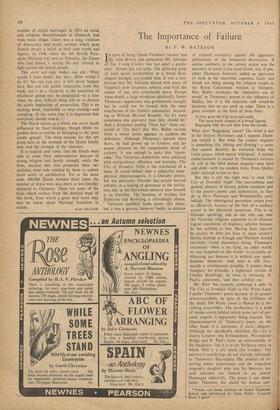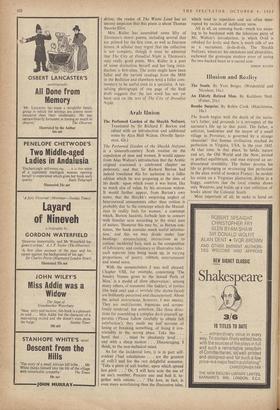The Importance of Failure
BY F. W.
BATESON
JN spite of being Queen Victoria's 'sinister' son (by John Brown, one presumes), Mr. Salteena of The Young Visiters was 'not quiet a gentle- man.' Almost but not quite. The glittering prize of total social acceptability• at a South Ken- sington tea-fight just eluded him. It was a mis- fortune that Mr. Salteena shared with many of Victoria's now forgotten subjects and with the author of one very remarkable poem. Except when drunk, a large exception admittedly, James Thomson's appearance was gentlemanly enough, but he could not be trusted with the most treacherous of the Queen's consonants. Accord- ing to William Michael Rossetti, 'his h's were sometimes less aspirated than they should be.' And a discarded reading 'Thine hair' (later cor- rected to 'Thy hair') that Mrs. Ridler records from a minor poem appears to confirm the deficiency. Although Thomson's parents were Scots, he had grown up in °London and his accent shivered on the unspeakable brink of cockney. It was enough to make him 'impos- sible.' The Victorian shibboleths were enforced with extraordinary efficiency and brutality. The City of Dreadful Night is the translation of a sense of social failure into a subjective meta- physical phantasmagoria. It is Outsider poetry, but this particular Outsider has passed beyond self-pity or a feeling of grievance to the realisa- tion that in the Darwinian universe man himself is an Outsider. The humbug of Insiders like Tennyson and Browning is refreshingly absent.
Victorian snobbery looks pretty silly today, but it was a gesture, however feeble, in defence
* POEMS AND SOME LEITERS OF JAMES THOMSON.
Edited and introduced by Anne Ridler. (Centaur Press, 3 gns.)
of cultural continuity against the aggressive philistinism of the Industrial Revolution. A similar snobbery to the correct accent was the necessity to know Latin (and Greek, too, if pos- sible). Thomson, however, added an ignorance of both to his uncertain aspirates, Latin and Greek not being among the subjects taught at the Royal Caledonian Asylum in Islington. Mrs. Ridler attributes the 'insensitive use of words' in Thomson's poems to the influence of Shelley, but it is the latinisms and would-be latinisms that set my teeth on edge. There is a gross example in the third of these lines: A river girds the City west and south,
The main north channel of a broad lagoon, Regurging with the salt tides from the mouth . • .
What does 'Regurging' mean? The word is not in the Oxford Dictionary and I suppose Thom-
son coined it. But what the context requires is something like 'ebbing and flowing'—a sense that cannot decently be extracted from the Latin gurges, which means 'whirlpool.' A similar embarrassment is caused by Thomson's mixture of -eth in the third person singular—also hath and doth—with the modern form. Even Shelley didn't descend as low as that.
But this is not the right way to read The City of Dreadful Night. The uncouthness and general absence of literary polish somehow add to the poem's power and authenticity, as they do in Piers Plowman and Wordsworth's early ballads. The unmitigated pessimism comes over so effectively because of the hint of a cockney accent in the rhetorical monotone. This is an Outsider speaking, and so one who can take the Victorian religious argument to its ultimate logical conclusion of dogmatic atheism because he has nothing to lose. Having been rejected by society he does not have to spare society's theistic feelings as Clough and Matthew Arnold inevitably found themselves doing. Thomson's extremism—there is no God, no qther world, no real happiness in this world—is curiously ex- hilarating just because it is without any quali- fications whatever. And man is still free: suicide is continuously possible. 'I ponder these thoughts,' his preacher, a nightmare version of Charles Bradlaugh, in what is obviously St. Paul's, announces, 'and they comfort me.'
Mr. Eliot has recently confessed a debt to The City of Dreadful Night in The Waste Land. I prefer Thomson's poem because of its greater disinterestedness. In spite of the brilliance of the detail The Waste Land is flawed by a dis- turbing evasiveness. The incoherence is a kind of smoke-screen behind which some sort of per- sonal tragedy is apparently being enacted. The phantasmagoria of Thomson's poem, on the other hand, is a consistent, if static, allegory. Although not specifically identified, the City is clearly London—the Embankment, Westminster Bridge and St. Paul's loom up unmistakably in the blackness--but it is in the Shelleyan sense in which 'Hell is a, city much like London.' The narrator's wanderings do not exclude references to Thomson's dipsomania (the product of re- curring manic depressions) and the long-dead sergeant's daughter who was his Beatrice, but such episodes are framed in an almost Dantesque objectivity. The poem is not about
James Thomson, but about the human con- .
dition; the reader of The Waste Land has an uneasy suspicion that this poem is about Thomas Stearns Eliot.
Mrs. Ridler has assembled some fifty of Thomson's minor poems, including several that are printed for the first time, as well as fourteen letters. A scholar may regret ,that the collection is not complete, though it must be admitted that The City of Dreadful Night is Thomson's only really good poem. Mrs. Ridler is. a poet of some distinction herself and her long intro- duction is first-class. The notes might have been fuller and the variant readings from the MSS in the Bodleian and elsewhere need a fuller com- mentary to be useful even to a specialist. A tan- talising photograph of one page of the final draft suggests that the last word has not yet been said on the text of The City of Dreadful Night.











































 Previous page
Previous page